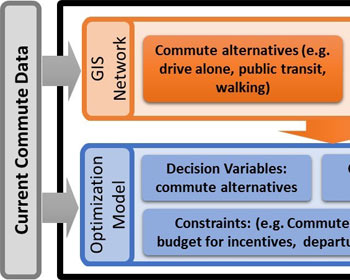Weighing Trade-Offs Between Emissions and Travel Time
Posted: May 1, 2019
 MPC research at the University of Colorado Denver explores an optimization system designed to identify optimal trade-offs between two important transportation objectives of minimizing greenhouse gases and air pollution emissions and total travel time while meeting preferences and convenience of business commuters. The developed optimization system consists of a travel survey, a Geographical Information System (GIS) model, and a multi-objective optimization model. Results show that the reduction of greenhouse gas and air pollution emissions is dependent on commuter tolerance. For example, a 15-minute time extension in commute tolerance (e.g., a longer commute time due to walking or taking mass transit) can reduce greenhouse gas and air pollution emissions by only 13%, while increasing commuter tolerance by 35 minutes can achieve a 25% reduction. The developed optimization system is designed to generate detailed solutions that identify optimal commute plan for each commuter while motivating commuters using monetary incentives supported by employers to cover extensions in commute duration.
MPC research at the University of Colorado Denver explores an optimization system designed to identify optimal trade-offs between two important transportation objectives of minimizing greenhouse gases and air pollution emissions and total travel time while meeting preferences and convenience of business commuters. The developed optimization system consists of a travel survey, a Geographical Information System (GIS) model, and a multi-objective optimization model. Results show that the reduction of greenhouse gas and air pollution emissions is dependent on commuter tolerance. For example, a 15-minute time extension in commute tolerance (e.g., a longer commute time due to walking or taking mass transit) can reduce greenhouse gas and air pollution emissions by only 13%, while increasing commuter tolerance by 35 minutes can achieve a 25% reduction. The developed optimization system is designed to generate detailed solutions that identify optimal commute plan for each commuter while motivating commuters using monetary incentives supported by employers to cover extensions in commute duration.
Moatassem Abdallah, Ph.D.
University of Colorado Denver
Business and Commute Optimization System: Development and Denver-Based Case Study
MPC-18-361